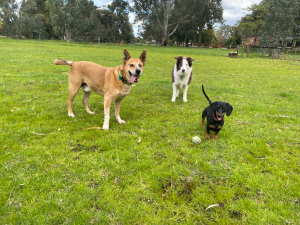A surge in behavioural problems in dogs post-pandemic has led to many owners seeking specialist help for their pets’ problems.
There’s no denying that dogs love attention; walks or runs, cuddles, and frequent playtime with their owners, are their favourite activities.
During the COVID-19 pandemic lockdowns, many dogs were with their human companions around the clock.
But with the world returning to normal, those same dogs are experiencing an increase in anxiety and reactivity now their humans have returned to the office.

Anxiety and reactivity in dogs
Dogs communicate their emotions through their body language, and they exhibit a range of physical signs and symptoms when they are feeling anxious or reactive.
While growling and baring teeth are well-known signs that a dog is not happy, there’s many others that owners should familiarise themselves with, especially if their pet is prone to anxiety.
Certified dog behaviourist and trainer, Lara Shannon, has long worked with reactive dogs and says it’s vital owners recognise the signs that their pet isn’t happy.
“Holding their body tense and low to the ground, hiding from you or other humans, growling, baring their teeth, or staring intensely, are all signs your dog is not happy,” says Lara.
“Behavioural problems in dogs can be triggered by developmental factors, like not being properly socialised when young.
“It can also be caused by physical issues such as pain or discomfort, while a negative past experience, or a change in their environment like we’ve seen since the pandemic, can trigger reactivity in dogs. ”
Warning signs to look out for
- Growling or snarling
- Baring teeth
- Tense, low body
- Dilated pupils
- Raised hackles
- Hiding
- Staring
What to do if your dog has behavioural issues
Lara says it’s not only important for owners to prevent situations that make their dogs angry or unhappy, but they need to know what to do after seeing the warning signs.

The first step to avoiding behavioural issues, is to avoid situations your pet finds stressful, says Lara.
“Whenever possible, avoid exposing your dog to stressful situations,” says Lara.
“If they are bothered by crowds, children, or certain situations, avoid those places and speak with a pet behaviourist or trainer about how to address it.”
Lara says owners should never punish their dog for acting out, as it’s only punishing them for feeling fear.
“They need to feel safe with you and know they can show you when they are afraid.
“Instead, remove your pet from the stressful situation immediately, and calmly, if an issue arises.”
Lara stresses that dogs are only reactive because of anxious and negative experiences, and they can learn to overcome their fears if handled properly.
One of the best things owners can do is utilise professional training to eliminate those behaviours,
“You can help your dog to remain calm and avoid negative reactions in stressful situations by using a combination of counter-conditioning and positive reinforcement training.
“As you work to train your reactive dog, find safe, secure spaces where the two of you can train together off-leash.”
Find a new dog-friendly play spot for your pooch
When looking for a local off-leash area that’s safe and secure, Lara urges pet owners to check out a new online community that offers just that.

SniffSpace is an online directory of safe, dog friendly play spaces available to rent by the hour around Australia.
“Dog parks or other public areas aren’t always suited to every pooch, so SniffSpace offers a wide range of secure, outdoor spaces for the two of you to work together.
“You can rent acreage for training, including grassy fields, water, and wooded areas, where you can train together privately.”












